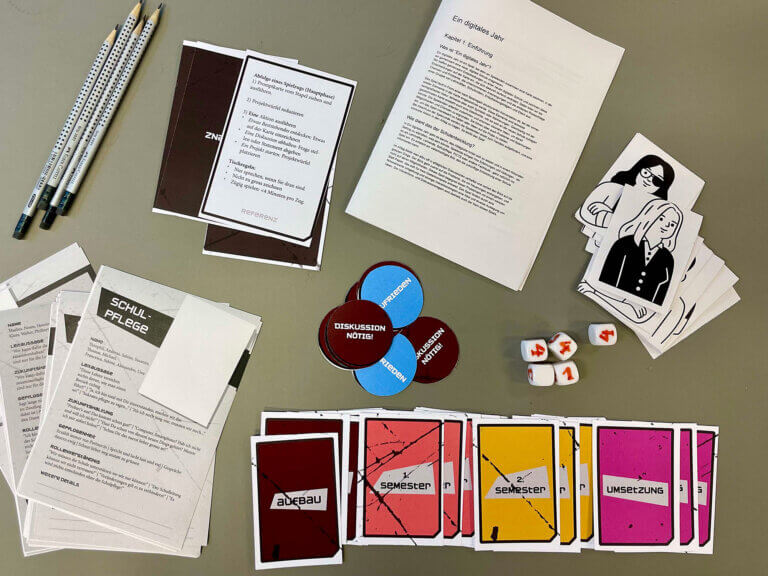Digital change is confronting schools at all levels with strategic, structural and cultural challenges. The digitally enriched simulation game “Edugame4Change” motivates school staff to explore new perspectives and consider potential changes.
The simulation game Edugame4Change encourages school stakeholders to explore new perspectives and initiate change in the context of digital transformation. A prototype of the simulation game was realised thanks to the PH Zurich’s 2021 Teaching Award. The project is currently being further developed in collaboration with the Zurich University of the Arts (ZHdK), supported by the DIZH. Tobias Röhl, project manager of the simulation game, on the current status of the project.
What is your aim with the augmented simulation game “Edugame4Change”?
We want to give schools a tool to help them position themselves in the digital transformation and find ways to help shape it. The playful approach provides a new perspective on the topic. In everyday life, people tend to stick to the tried and tested and get stuck in the constraints of day-to-day business. With “Edugame4Change”, we enable the participants in the simulation game to step out of their own role and take on a new perspective. For example, a head teacher takes on the role of a teacher or a PICTS (Pedagogical ICT Support) takes on the role of the school management. This opens up new insights and allows the team to come up with innovative and effective solutions.
Where does the project stand today?
Based on an earlier prototype that we developed as part of the 2021 Teaching Award, we were able to finalise another version of the game together with game designers Stefan Schmidlin and Sonja Böckler from ZHdK. We are currently testing it at two schools in Zurich. The game is being played by three to five people at each school: school management, teachers and PICTS. The feedback we receive from the schools helps us to further develop the game. The game will be revised again next year, after which we expect further adjustments and tests. Our aim is to hand over the fully developed game to Hep-Verlag by the end of 2024, who plan to realise and publish it in 2025.
Do you already have initial findings and feedback from the school sector?
At first, people are surprised that our game is aimed at school staff and not children. But as soon as they get involved with the game, they are amazed at its potential, how it stimulates their creativity and imagination and how it makes them think. It is currently becoming clear that the game needs to be more structured. It should encourage them to think freely and, to a certain extent, without restrictions about the school of the future. Some people are somewhat overwhelmed by this openness. This is precisely why we carry out the test rounds. This allows us to make adjustments and tailor the game even better to our target group.



You can find out more about digital education at primary school here.
This article was published on the PHZH website on 6 December.